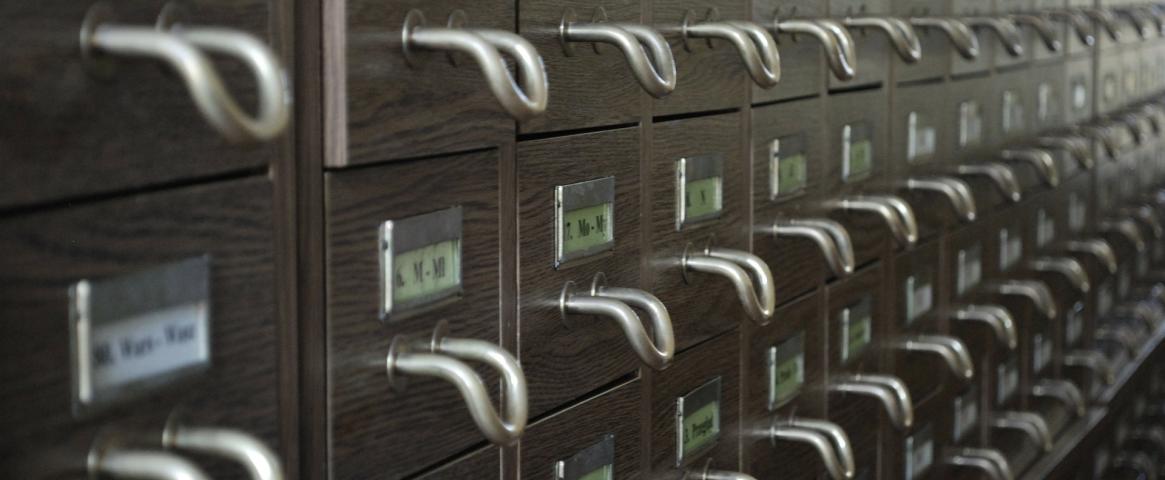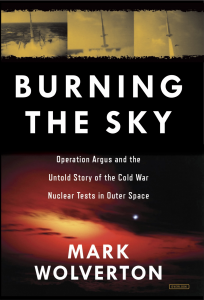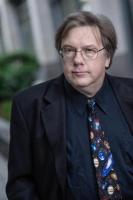
Mark Wolverton: Burning the Sky
For this column, NASW book editor Lynne Lamberg asks NASW authors to tell how they came up with the idea for their book, developed a proposal, found an agent and publisher, funded and conducted research, and put the book together. She also asks what they wish they had known before they began working on their book, what they might do differently the next time, and what tips they can offer aspiring authors. She then edits the A part of that Q&A to produce the author reports you see here.
Publication of NASW members’ reports in Advance Copy does not constitute NASW’s endorsement of their books. NASW welcomes your comments, and hopes this column stimulates productive discussions.
BURNING THE SKY:
OPERATION ARGUS AND THE UNTOLD STORY
OF THE COLD WAR NUCLEAR TESTS IN OUTER SPACE
Mark Wolverton
Harry N. Abrams, November 27, 2018, $28.95
ISBN-10: 1468314173; ISBN-13: 978-1468314175
Wolverton reports:
As a child of the Cold War, I can vividly remember the existential dreads of that era: standing in my suburban backyard and nervously awaiting the appearance of mushroom clouds on the horizon in the direction of Philadelphia, noting "Fallout Shelter" signs in the school building, reading science fiction stories, and watching movies steeped in atomic paranoia. I've always had an intense interest in the actual history of those times, the facts behind all the fear and cultural hysteria. This has led me to a great deal of research and writing on the subject.
I first wrote about the Argus project in a brief article for the Air & Space Smithsonian magazine in 2008. I don't recall where I first heard about the Argus project, but it struck me as yet another example of the many, many schemes that seemed perfectly reasonable during the Cold War, yet completely outlandish today.Sometime afterward, as my curiosity led me to research the story further, it occurred to me that Argus could make a good book topic—an impression reinforced by the incredulous "They actually did THAT?" reaction I'd receive whenever I mentioned Argus to someone. I also realized that the Argus/space nuke story had renewed present-day relevance with the advent of new and hostile nuclear threats such as those from Iran and North Korea.
I completed serious research for the project over the past five years or so, including work in some government and private archives. Although much of the material on Argus has been declassified over the years, I faced a different challenge: because Argus was originally conducted in extreme secrecy and on an unusually tight schedule, many aspects of the operation were only casually recorded or not documented at all. The opportunity to talk with surviving Argus veterans and to access interviews and oral histories helped to fill in these gaps.
I wrote most of the book while at MIT on a Knight Science Journalism Fellowship from 2016-17, which was invaluable for the access it afforded to various library and archival resources.
Contact info:
- Mark Wolverton, mark@markwolverton.com, http://www.markwolverton.com/
- Agent: Michelle Tessler, 212-242-0466, michelle@tessleragency.com
- Publicist: Christopher Cappello, 212-229-7125, ccappello@abramsbooks.com
NASW members: will your book be published soon? Take advantage of this opportunity for shameless self-promotion. Submit your report for Advance Copy.
Tell your fellow NASW members how you came up with the idea for your book, developed a proposal, found an agent and publisher, funded and conducted research, and put the book together. Include what you wish you had known before you began working on your book, or had done differently.
See https://www.nasw.org/advance-copy-submission-guidelines.
View Advance Copy archives at https://www.nasw.org/member-article/advance-copy.
Thinking of writing a book? If you are a NASW member, you may access a list of more than 150 books and online resources to help you craft your book proposal, find an agent and funding sources, negotiate your contract, learn about self-publishing, publicize and market your book, and more at https://www.nasw.org/article/write-book.
Send book info and questions about book publishing to Lynne Lamberg, NASW book editor, llamberg@nasw.org.
Advance Copy
The path from idea to book may take myriad routes. The Advance Copy column, started in 2000 by NASW volunteer book editor Lynne Lamberg, features NASW authors telling the stories behind their books. Authors are asked to report how they got their idea, honed it into a proposal, found an agent and a publisher, funded and conducted their research, and organized their writing process. They also are asked to share what they wish they’d known when they started or would do differently next time, and what advice they can offer aspiring authors. Lamberg edits the authors’ answers to produce the Advance Copy reports.
NASW members: Will your book be published soon? Visit www.nasw.org/advance-copy-submission-guidelines for information on submitting your report.
Publication of NASW author reports in Advance Copy does not constitute NASW's endorsement of any publication or the ideas, values, or material contained within or espoused by authors or their books. We hope this column stimulates productive discussions on important topics now and in the future as both science and societies progress. We welcome your discussion in the comments section below.





